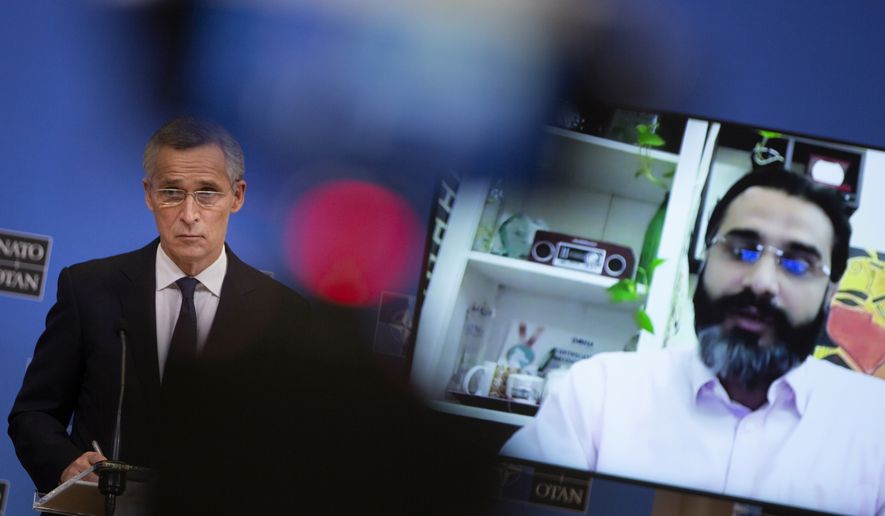The U.S. and its NATO allies are deadlocked about their military future in Afghanistan, with a key May 1 withdrawal deadline fast approaching and no clear signals from either Washington or Brussels on the path forward.
Thursday’s meeting of NATO defense ministers, including new U.S. Defense Secretary Lloyd Austin, was expected to offer some clues on how the Biden administration might handle one of its first major foreign policy decisions and whether it will abide by the terms of a historic deal former President Trump struck with the Taliban last year.
That pact calls for all U.S. troops to exit Afghanistan by May 1 if the Taliban fulfills its promises, including a permanent break from terrorist groups such as al Qaeda and tangible progress in direct peace talks with the Afghan government.
While just 2,500 of the roughly 10,000 troops stationed in Afghanistan are Americans, Washington’s decision on whether to stick to the May 1 deadline will determine NATO’s fate as well. NATO Secretary-General Jens Stoltenberg and alliance defense chiefs seem to have received little clarity from the Pentagon on Thursday as to what Mr. Biden’s team intends to do.
“We are faced with many dilemmas and there are no easy options,” Mr. Stoltenberg said at a press conference immediately after the meeting. “At this stage, we have made no final decision on the future of our presence [in Afghanistan].”
A day after Secretary of State Antony Blinken spoke by phone with Afghan President Ashraf Ghani, Mr. Austin told his fellow defense ministers Thursday that “the U.S. is conducting a thorough review of the conditions of the U.S.-Taliban agreement to determine whether all parties have adhered to those conditions.”
Mr. Biden as vice president expressed deep skepticism about the U.S. military mission in Afghanistan, now entering its 20th year.
Now his options include following Mr. Trump’s lead despite continuing violence and instability in Kabul, or maintaining and even expanding the U.S. military footprint in one of his first major acts in office.
Much like his predecessor, Mr. Biden campaigned on stopping “forever wars” in the Middle East and bringing troops home — though the administration also has suggested it does not necessarily feel bound by the Trump deal and could keep troops in Afghanistan past May 1.
Foreign policy specialists say Thursday’s indecisive summit shouldn’t be surprising, as it’s clear the White House has yet to decide what to do and that Brussels is paralyzed until the U.S. acts.
“The danger here is that Biden, Blinken and [National Security Adviser Jake Sullivan] have no idea what to do but are setting the stage to simply blame the Trump plan should Afghanistan collapse,” said former Defense Department official Michael Rubin, now a resident scholar at the American Enterprise Institute. “That might make good American politics, but it betrays an ally and is neither wise nor leadership.”
“NATO has zero options to diverge from the U.S.,” Mr. Rubin told The Washington Times. “They have essentially been window-dressing all along.”
The U.S.-led NATO mission is aimed at providing some semblance of security across the country while also training Afghan security forces, which would take on a significantly larger role in the absence of American troops.
Thursday brought yet another reminder of instability facing Afghanistan, with an explosion at Kabul University killing at least two university lecturers. Police in the Afghan capital said a bomb was attached to the vehicle of Mubasher Muslimyar and Marouf Rasikh, members of the university’s Islamic studies faculty, according to media reports.
No group has claimed responsibility for the assault. Over the past year, Taliban violence has mostly been directed at Afghan security forces, though other extremist groups — including the Islamic State — also operate inside the country and often carry out horrific attacks.
Meanwhile, few believe the Taliban has lived up to the commitments it made in its peace deal with the U.S.
Pentagon reports and international observers, for example, have said in recent months that the Taliban still associates with al Qaeda fighters. Taliban violence also remains unacceptably high.
The Taliban’s unwillingness or inability to fully live up to its end of the bargain has been a constant source of frustration for international leaders.
“I have many times made clear that the Taliban needs to negotiate in good faith, violence has to be reduced, and the Taliban has to stop cooperating with international terrorist groups that are planning terrorist attacks on our own countries, allied countries,” Mr. Stoltenberg said Thursday.
• Ben Wolfgang can be reached at bwolfgang@washingtontimes.com.




Please read our comment policy before commenting.